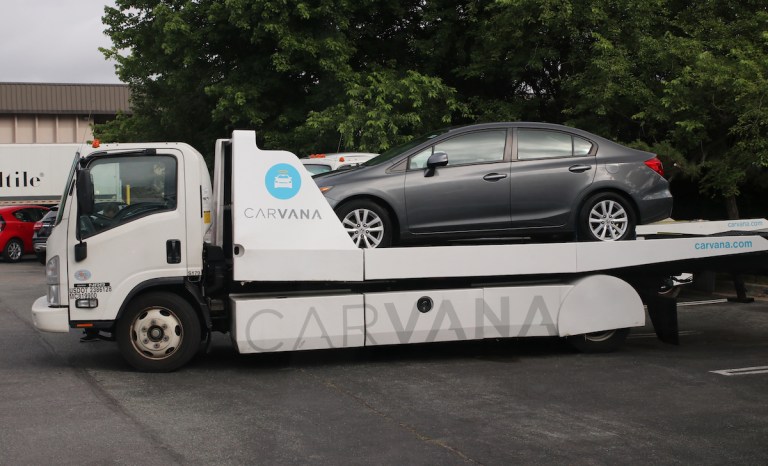Online Car Platforms Bet on Digital Transformation to Drive Sales Growth

For online car platforms, the road to profitability has been volatile and oftentimes elusive.
“Inventory’s been lumpy, aging and — in the age of (still) high interest rates — tough to afford for many consumers, as the spate of recent earnings reports from the online platforms show,” PYMNTS wrote in November.
Last month, Vroom announced it was pulling the plug on its eCommerce operations and discontinuing its used vehicle dealership business as it shifts focus to its automotive finance arm, United Auto Credit, and CarStory, a provider of artificial intelligence-powered analytics and digital services for automotive retail.
The transition involves restructuring, with Vroom planning to lay off 800 employees, as disclosed in a January filing with the Securities and Exchange Commission. Around 90% of these layoffs are expected to affect employees not engaged with United Auto Credit or CarStory, signifying a strategic shift in the company’s operations.
“Although we were unable to raise the capital necessary to achieve profitability in our eCommerce operations, we are committed to responsibly managing our remaining businesses and prudently deploying our capital as we seek to maximize value for all of our stakeholders,” Robert Mylod, independent executive chair of the board, said Jan. 22.
To weather the storm and entice more buyers, digital automotive platforms have been enhancing features and implementing cost-cutting measures.
During a quarterly earnings call in November, CarGurus executives shed light on the platform’s operational enhancements, including the introduction of a new feature enabling dealers to present two distinct offers to consumers considering selling their cars.
One offer entails the dealer picking up the vehicle at the seller’s home, while the other option involves the seller delivering the car to the dealer. This dual-offer feature provides consumers with greater flexibility and convenience while empowering dealers to tailor their offers accordingly.
CarGurus Chief Operating Officer Sam Zales highlighted the significance of this feature during the earnings call, stating: “Consumers are now getting a second offer, which is a choice: ‘Would you like to drop that off at your local dealership and get a higher price point there?’ While there isn’t the same convenience factor, you get a higher price point.”
AUTO1 Group, whose digital platform serves the European used car market, also disclosed plans to expand its drop-off locations in customer-centric locations during a November earnings presentation, It is pushing to enhance accessibility and streamline the selling process for consumers.
Fostering Innovation Through Dealer Partnerships
Carvana, which reported a 13% decrease in retail unit sales to 76,090 during Q4 2023, is banking on both existing and new technology to drive sales growth this year.
For instance, when acquiring cars for resale, Carvana offers potential sellers the convenience of completing the entire transaction from their desktop or mobile device, as highlighted in the company’s quarterly earnings call last month.
Additionally, Carvana uses its new proprietary CARLI technology to streamline inspection and reconditioning processes. The system not only automates parts ordering and tracking but also uses machine learning to identify and manage costs effectively.
Meanwhile, Nissan is planning to unveil an enhanced iteration of its Nissan@Home digital shopping platform in March, following collaborative efforts with dealers to refine the remote car buying tool. Judy Wheeler, divisional vice president of Nissan sales and regional operations at Nissan U.S., shared this update during the 2024 Automotive News Retail Forum earlier this month, according to a report by Automotive News and a video of the session available on YouTube.
The BUY@HOME end-to-end platform offers customers a seamless online car-buying experience. Users can select features and specifications to personalize their vehicle, and once their configuration is complete, they can browse the dealer inventory and select the “buy now” button to purchase the vehicle, which is then delivered to their doorstep.
According to Wheeler, while January was not a robust month for sales, 10,000 people went through the vehicle configuration process, resulting in approximately 25,000 vehicles being added to their online garages. Over the last few months, the online platform has successfully facilitated 35,000 car sales.
Amidst global macroeconomic uncertainty and its implications for online car sales, the key to success in this sector seems to lie in prioritizing digital transformation within business strategies.
This strategic focus is not only enhancing resilience against economic fluctuations but also enabling organizations to capitalize on the transformative power of digital technologies, while driving sustainable growth.
For all PYMNTS digital transformation coverage, subscribe to the daily Digital Transformation Newsletter.